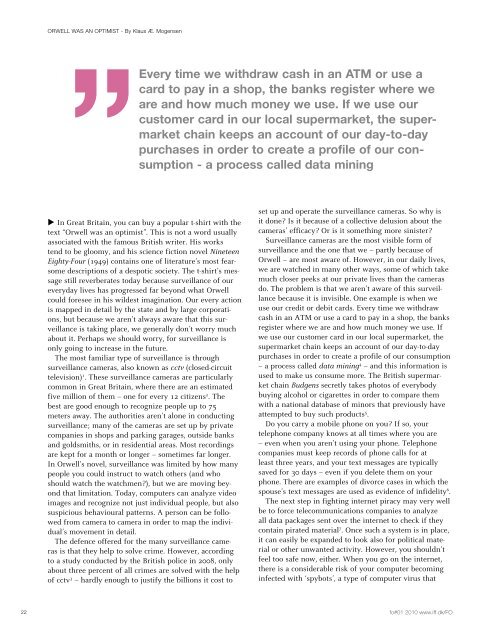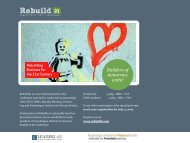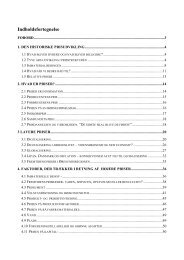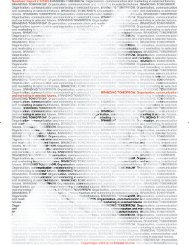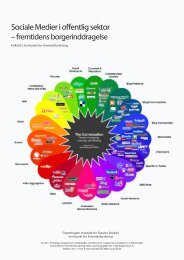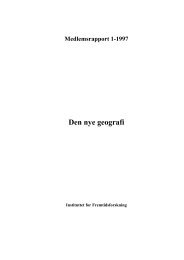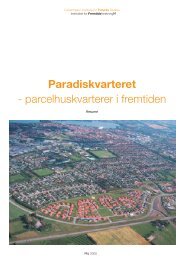Entire issue - Instituttet for Fremtidsforskning
Entire issue - Instituttet for Fremtidsforskning
Entire issue - Instituttet for Fremtidsforskning
- No tags were found...
You also want an ePaper? Increase the reach of your titles
YUMPU automatically turns print PDFs into web optimized ePapers that Google loves.
Orwell Was an Optimist - By Klaus Æ. Mogensen<br />
Every time we withdraw cash in an ATM or use a<br />
card to pay in a shop, the banks register where we<br />
are and how much money we use. If we use our<br />
customer card in our local supermarket, the supermarket<br />
chain keeps an account of our day-to-day<br />
purchases in order to create a profile of our consumption<br />
- a process called data mining<br />
u In Great Britain, you can buy a popular t-shirt with the<br />
text “Orwell was an optimist”. This is not a word usually<br />
associated with the famous British writer. His works<br />
tend to be gloomy, and his science fiction novel Nineteen<br />
Eighty-Four (1949) contains one of literature’s most fearsome<br />
descriptions of a despotic society. The t-shirt’s message<br />
still reverberates today because surveillance of our<br />
everyday lives has progressed far beyond what Orwell<br />
could <strong>for</strong>esee in his wildest imagination. Our every action<br />
is mapped in detail by the state and by large corporations,<br />
but because we aren’t always aware that this surveillance<br />
is taking place, we generally don’t worry much<br />
about it. Perhaps we should worry, <strong>for</strong> surveillance is<br />
only going to increase in the future.<br />
The most familiar type of surveillance is through<br />
surveillance cameras, also known as cctv (closed-circuit<br />
television) 1 . These surveillance cameras are particularly<br />
common in Great Britain, where there are an estimated<br />
five million of them – one <strong>for</strong> every 12 citizens 2 . The<br />
best are good enough to recognize people up to 75<br />
meters away. The authorities aren’t alone in conducting<br />
surveillance; many of the cameras are set up by private<br />
companies in shops and parking garages, outside banks<br />
and goldsmiths, or in residential areas. Most recordings<br />
are kept <strong>for</strong> a month or longer – sometimes far longer.<br />
In Orwell’s novel, surveillance was limited by how many<br />
people you could instruct to watch others (and who<br />
should watch the watchmen), but we are moving beyond<br />
that limitation. Today, computers can analyze video<br />
images and recognize not just individual people, but also<br />
suspicious behavioural patterns. A person can be followed<br />
from camera to camera in order to map the individual’s<br />
movement in detail.<br />
The defence offered <strong>for</strong> the many surveillance cameras<br />
is that they help to solve crime. However, according<br />
to a study conducted by the British police in 2008, only<br />
about three percent of all crimes are solved with the help<br />
of cctv 3 – hardly enough to justify the billions it cost to<br />
set up and operate the surveillance cameras. So why is<br />
it done Is it because of a collective delusion about the<br />
cameras’ efficacy Or is it something more sinister<br />
Surveillance cameras are the most visible <strong>for</strong>m of<br />
surveillance and the one that we – partly because of<br />
Orwell – are most aware of. However, in our daily lives,<br />
we are watched in many other ways, some of which take<br />
much closer peeks at our private lives than the cameras<br />
do. The problem is that we aren’t aware of this surveillance<br />
because it is invisible. One example is when we<br />
use our credit or debit cards. Every time we withdraw<br />
cash in an ATM or use a card to pay in a shop, the banks<br />
register where we are and how much money we use. If<br />
we use our customer card in our local supermarket, the<br />
supermarket chain keeps an account of our day-to-day<br />
purchases in order to create a profile of our consumption<br />
– a process called data mining 4 – and this in<strong>for</strong>mation is<br />
used to make us consume more. The British supermarket<br />
chain Budgens secretly takes photos of everybody<br />
buying alcohol or cigarettes in order to compare them<br />
with a national database of minors that previously have<br />
attempted to buy such products 5 .<br />
Do you carry a mobile phone on you If so, your<br />
telephone company knows at all times where you are<br />
– even when you aren’t using your phone. Telephone<br />
companies must keep records of phone calls <strong>for</strong> at<br />
least three years, and your text messages are typically<br />
saved <strong>for</strong> 30 days – even if you delete them on your<br />
phone. There are examples of divorce cases in which the<br />
spouse’s text messages are used as evidence of infidelity 6 .<br />
The next step in fighting internet piracy may very well<br />
be to <strong>for</strong>ce telecommunications companies to analyze<br />
all data packages sent over the internet to check if they<br />
contain pirated material 7 . Once such a system is in place,<br />
it can easily be expanded to look also <strong>for</strong> political material<br />
or other unwanted activity. However, you shouldn’t<br />
feel too safe now, either. When you go on the internet,<br />
there is a considerable risk of your computer becoming<br />
infected with ‘spybots’, a type of computer virus that<br />
22 fo#01 2010 www.iff.dk/FO


